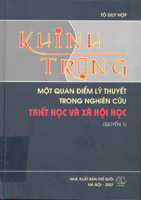
Tô Duy Hợp
Hanoi: The World Publishing House, 2007, 768 pages
Reveiwed by Le Ngoc Hung, Institute for Sociology, Ho Chi Minh National Academy of Politics and Administration, Hanoi, Vietnam
There is a common view of Sociology in Vietnam as an imported discipline, with no indigenous sociological theory by Vietnamese scholars. However, such a view is incorrect, as proven by Prof. Tô Duy Hợp’s Disrespect/Respect: A Theoretical Viewpoint in Philosophical and Sociological Studies, published in 2007 on the occasion of his 65th birthday. The book consists of a summary of his “Disrespect/Respect” (Khinh-Trọng) theory and a collection of 36 of his papers which were published in different Vietnamese scientific journals from 1977 to 2006. These papers are divided evenly into two parts: eighteen papers in Part I concentrate on philosophical studies, while the remaining papers in Part II focus on sociological research. In each part of the book, the author arranges his writings in a chronological order.
The name “Disrespect/Respect” (Khinh-Trọng) reveals internal dilemmas: on the one hand, its content is always a process of understanding and solving complicated problems in Philosophy and Sociology and, on the other hand, the very process of approaching complicated problems presents “Disrespect/Respect” issues of choice. The fundamental dilemma in Philosophy that “Disrespect/Respect” theory seeks to understand and resolve is that of formal logic and/or dialectical logic. “Disrespect/Respect” theory provides relevant principles of choice that consist of the following paradigms: (1) “Disrespect/Respect” extreme paradigms: either pure formal logic or pure dialectical logic, (2) moderate khinh-trọng paradigms, or a mixed paradigm emphasizing either formal logic or dialectical logic, (3) the undistinguished “Disrespect/Respect” paradigms of formal and dialectical logic.
In philosophical research Disrespect/Respect (Khinh-Trọng) theory highlights abstract dilemmas, but in sociological research it emphasizes concrete problems. To Duy Hop developed his khinh-trọng theory in rural sociological studies dealing with three specific dichotomies of peasant and/or non-peasant; agricultural and/or non-agricultural; and rural and/or non-rural. According to khinh-trọng theory the understanding and resolving of these dualisms are paradigms of choice of (1) Extreme paradigms of “getting this, losing that”, (2) Moderate paradigms of “more of this, less of that,” and (3) Undistinguished paradigms of “good for both sides”. To Duy Hop promises that in volume 2, which he plans to publish in the near future, his theory will be applied to other sociological dilemmas such as structure – action, function – conflict that have been among the deepest concerns of sociological theorists.
